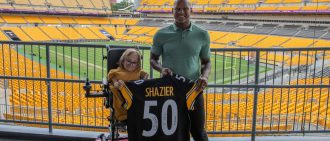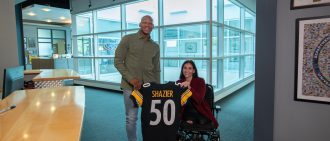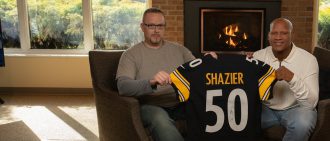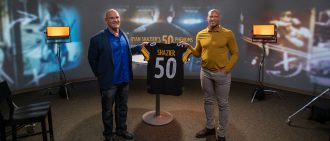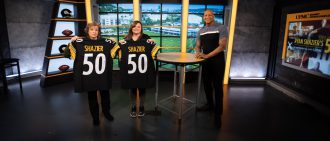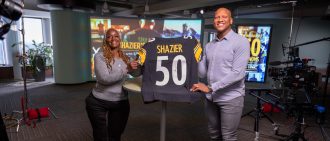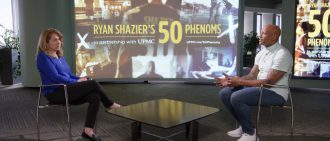A little under five years ago, Jared Evans hit rock bottom.
An unsuccessful surgery to treat his scoliosis left Jared in severe pain. He became addicted to narcotics prescribed for that pain. Relationships crumbled.
In constant pain and needing a walker or cane to move around, Jared’s weight increased dramatically. He fell into a depression and thought about suicide.
Instead, Jared got the help he needed. He found his faith and a new church, which had a recovery group that helped him overcome his addiction. And in 2020, he met UPMC neurosurgeon Dr. David Okonkwo, MD, who performed the surgeries to fix his spine.
“My life had fallen literally apart, and I had to rebuild from scratch,” Jared says. “And that started with fixing me. And that was a feat to pull away from addiction and then go into massive surgery. But Dr. Okonkwo assured me that it was possible and that I would walk again.”
Almost two years after his first surgery at UPMC, and almost five years sober, Jared finds himself in a much better place. He still experiences some pain, but he is much healthier than he was before — both mentally and physically.
“The challenges that I’ve gone through have changed me for the better,” Jared says. “You can let a challenge or a situation define you, or you can let it refine you. And I choose to look at it through a positive spectrum. I’ve let these tragedies and traumas refine me as a person.”
Ryan Shazier's 50 Phenoms Season 4
‘It Was Absolutely Debilitating’
Doctors diagnosed Jared with scoliosis when he was 12 or 13 years old. The condition, which causes an abnormal curvature of the spine, affects about 2% to 3% of the U.S. population. Many people are asymptomatic and don’t realize they have scoliosis until they’re diagnosed.
Jared was asymptomatic at first. Doctors fitted him with a brace and told him his condition would resolve as he got older. But that didn’t happen.
“My spine continued to curve, and it ended up looking basically like a question mark,” Jared says. “I had a significant curvature in my upper spine. My spine was never connected to my pelvis bone because of how my spine was so deformed, and things progressively got worse.”
Late in his teenage years, doctors began to prescribe medication to manage the pain his scoliosis caused him. But he didn’t receive surgical care for the condition until adulthood.
In 2016, while hunting, Jared was stepping over a downed pine tree on a hillside when he slipped on an ice-covered rock.
“My left leg went one way, and the right leg went the other,” he says. “I came down at a funny angle, and I actually snapped my lower lumbar spine.”
Now, surgery was necessary. Jared underwent a laminectomy of his lower spine, with the doctor placing two rods and eight screws in his lower back.
But the surgery failed. Jared’s spine did not fuse properly, and the screws broke within a year. It left him in severe pain.
“It was absolutely debilitating,” he says.
Never Miss a Beat!
Join the email list and receive updates for Ryan Shazier's 50 Phenoms.
Thank you for subscribing!
You can now select the specific newsletters you'd like to receive.
You are already subscribed.
Subscribe to more newsletters in our email preference center.
Sorry, an error occurred. Please try again later.
Get Healthy Tips Sent to Your Phone!
‘I Wanted Out’
After his failed surgery, Jared was in extreme pain. But doctors decided against opening him back up to remove the broken hardware. Instead, they prescribed him oxycodone, a powerful opioid, to deal with the pain.
Oxycodone is a highly addictive drug, and Jared became addicted. Depressed and unable to move well because of his pain, Jared’s activity level dropped. His weight grew to almost 400 pounds, and his engagement fell apart.
“I was depressed, I had a lot of anxiety, and I hurt,” he says. “It was a day-to-day grind, and it was a challenge. And I turned it into, you know, ‘I’m going to get better.’ I refused to take no as an answer.”
Knowing he needed a change, Jared and his son moved to a new community in 2018. He went through Alcoholics Anonymous and Narcotics Anonymous. He also found a new church that had a recovery group called Celebrate Recovery.
The 30 members of Celebrate Recovery help each other with addiction, disabilities, family issues, and other problems. Casey Defranco, one of the group leaders, says Jared was a “disaster” when he first came.
“His life fell apart because of his disability and the failed surgery,” Casey says. “So he came here. He didn’t have too much of a support system, he didn’t have too much faith. He was just being handled by the medical system. So he came in, and I really got to know him on a personal level. We sifted through a lot of his problems, set up some goals, and saw it through.”
Casey, who has multiple sclerosis, shared his own medical story with Jared. He says Jared was very determined to overcome his addiction.
“I’m glad I got the help that I got,” he says. “They came to my aid. They didn’t ask questions. They came to help. And at rock bottom, that’s where I met Jesus Christ. My faith has played an instrumental role in all of this.”
‘A Mind-Blowing Difference’
Jared had overcome his addiction. But he was still in severe pain from the failed surgery.
In addition to the pain, one of the broken screws was pressing on a nerve in Jared’s back. At times, it would cause him to lose the feeling in his legs and fall.
Looking for a surgeon to help with his physical problems, Jared sought out UPMC. There he was connected with neurosurgeon David Okonkwo, MD. Dr. Okonkwo is director of UPMC’s Scoliosis and Spinal Deformity Program and Neurotrauma Program and clinical director of UPMC’s Brain Trauma Research Center.
Dr. Okonkwo and Jared first met in 2020.
“I felt as though Jared was desperately searching for someone who was actually going to listen to him,” Dr. Okonkwo says. “And that what he needed was less of a surgeon and more of a doctor. And to Jared’s credit, his goal was to get better. He knew that he had a very serious problem. He also knew that he had lost control of the situation.”
Dr. Okonkwo says he had some “pretty stark, frank conversations” with Jared.
He told Jared he needed to lose a substantial amount of weight and needed a clear plan for sobriety. But he says Jared was open, honest, and willing to do what was necessary. He also had the support he needed from friends and family.
Jared had his own request for Dr. Okonkwo: He wanted to go through the surgery and recovery without narcotics. Dr. Okonkwo told him it would be possible. UPMC’s Pain Management Program has therapies for patients who have overcome addiction.
“We spent a lot of time preparing Jared for what he was going to face with this operation,” Dr. Okonkwo says. “And then you add on the extra issue of needing to have a plan that didn’t involve pain medications and also having a plan that was going to allow him to maintain his sobriety while still recovering from something this substantial.
“It wasn’t easy, but it’s amazing what humans can do when they have a goal and when they believe in a plan to get them to their goals. The human spirit is a really inspirational thing.”
Over the next several months, Jared changed his diet and lost almost 100 pounds. He maintained his sobriety. In January 2021, he was ready for surgery.
Dr. Okonkwo went in through Jared’s back, making an incision the entire length of his back. He placed screws and rods from the top of the thoracic spine down to the pelvis. The procedure straightened the spine, restoring structural integrity, posture, and balance.
The following week, Dr. Okonkwo completed the scoliosis correction through the front. He put four bolts into Jared’s lower spine to secure it to his pelvis.
Jared felt the fixes almost immediately.
“He had fixed things that were wrong for 20-some years,” he says. “I wasn’t supposed to leave the hospital after reconstructive spine surgery in six days, but I did so under my own power. I walked out, and I didn’t take home any drugs other than my antibiotics.”
The surgeries straightened Jared’s spine significantly. He also could walk more normally with his spine and pelvis stabilized.
“It’s a mind-blowing difference,” he says.
‘I Wanted a Success Story Out of This’
Although the surgeries were a success, Jared still faced a difficult recovery — and he knew he had to do it without narcotics. He says he “white-knuckled” through the pain, but ultimately got through his recovery without narcotics.
“I wanted a success story out of this,” Jared says. “I didn’t want a repeat of what happened in 2017.”
Jared went through aquatic therapy, which helped with the pain he was feeling after the surgery. He also continued to lose weight, knowing that the less weight he carried, the less pressure it would put on his back.
While physical therapy helped with his physical health, he says the members of Celebrate Recovery and his family also played key roles during that time.
“There were a lot of men who had former addictions that were instrumental in my recovery because they knew that it’s like walking up an escalator that’s going down,” he says. “If you stop walking forward, you’re going to start going backwards.
“Having men of faith come to my bedside and pray over me or pray for me, call me, and let me know, ‘Hey, we know that you’re down and out, but we want to let you know that we’re thinking about you, we’re praying for you,’ that ultimately helped more than anything.”
In December 2021, Dr. Okonkwo performed a third procedure. He removed a single screw from Jared’s back that was causing him problems.
The third surgery meant another long recovery. But by June 2022, Jared was functioning mostly as normal.
The severity of Jared’s original spinal injury means he’ll never be 100%, and he still deals with pain. But Dr. Okonkwo describes Jared as “light years ahead” of where he was.
Jared now can go fishing with his son. He can walk on trails without using a cane or walker. He goes to the gym three days a week, where he walks on the treadmill and uses resistance machines. He can even use a bike — as long as it has enough shocks on it to provide support for his back.
“Dr. Okonkwo has definitely given me a new lease on life,” he says.
Casey from Celebrate Recovery says it’s always inspiring to see success stories like Jared’s.
“It rejuvenates me and my program,” he says. “Every time I see someone come in and do well, it gives a little hope.”
Jared says his situation showed him people are stronger than they think. He advises people going through difficult situations to keep believing in themselves.
“Knowing that, with each passing day you’re getting better, keep putting that one foot in front of the other,” he says. “Eventually, you’ll get there.”
About Neurosurgery
The UPMC Department of Neurosurgery is the largest academic neurosurgical provider in the United States. We treat conditions of the brain, skull base, spine, and nerves, including the most complex disorders. We perform more than 11,000 procedures each year, making our team one of the most experienced in the world. Whether your condition requires surgery or not, we strive to provide the most advanced, complete care possible. Our surgeons are developing new techniques and tools, including minimally invasive treatments. Find an expert near you.
